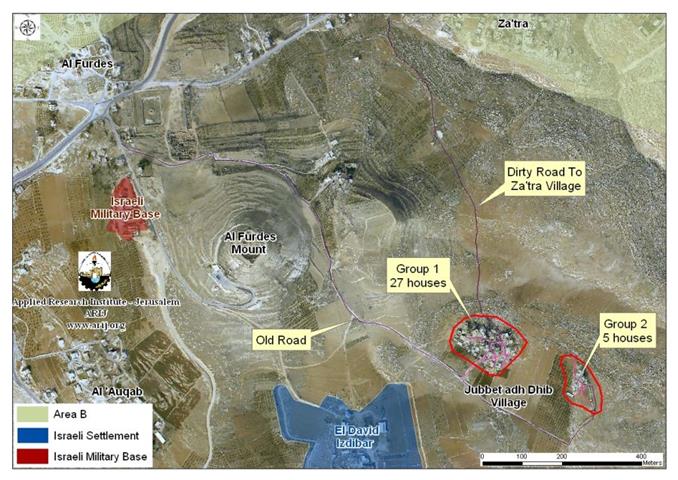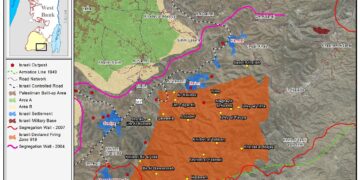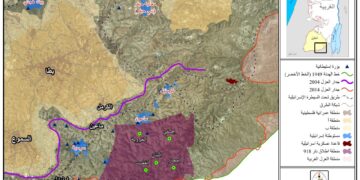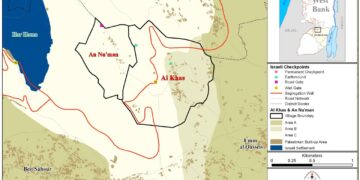On February 2, 2010, Israeli settlers from El David settlement accompanied by the Israeli Occupation forces attacked Palestinian residents of Jub Altheib village and other international activities while they were planting olive trees on their lands. These settler attacks came as an attempt to take over the land, which is located very close to the settlement, and drive Palestinians out of the area.
This most recent attack on Palestinian agriculture follows months of Israeli settlers’ attacks and harassments aimed at preventing Palestinian farmers from plowing their fields, which are located close to Israeli settlements, with the ultimate goal of annexing them to the nearby settlements. In addition, in recent months, Israeli occupation forces have consistently used closed military zone orders to prevent Palestinians from working in their lands.
Jub Althieb Village, an overview:
To the southeastern part of Bethlehem city lies the village of Jub Altheib. It is located in what is classified as area ‘C’ according to Oslo II Interim Agreement that was signed between the Palestinians and Israelis in September 1995. Under the Oslo Agreement Israel retains full control over security and administration issues in C area.
The village consists of two semi-separated small communities. The first consists of twenty seven houses with a total population of 120; while the second community consists of five houses with a total population of twenty. To its southwest lies the settlement of ‘El David’ and an Israeli military base which protects the settlers of ‘El David,’ while to its northwest, lies Herodion Mountain or what is locally known as ‘Al Furdeis Mountain’.
There are two separate roads leading to the village of Jub Altheib; the first is unpaved dirt road of 1.7 km long which was constructed during the Ottoman Era. This road is often closed due to, security reasons as claimed by the Israeli occupation forces stationed at the Israeli military base site located next to the settlement of El David, and the Israeli settlers actions against Palestinian residents in the village. The second is a dirt road and is considered the only alternative road for village residents to access the nearby Palestinian communities such as Za’atara. It is one kilometer long and it can’t be used during winter time because of rain and mud. See Map 1
The Suffering of Jub Altheib residents
Jub Altheib village residents experience difficulties in everyday life due to the Israeli restrictions imposed on them. They are not allowed to bring various kinds of food to their homes or to bring construction materials for the rehabilitation of their homes and lands. Village residents also lack basic necessities and resources except for water, some agricultural activities, and livestock herding, which are their sources of income. In addition, the village lacks shops, grocery stores, schools and health centers.
The Israeli occupation authorities have also built a waste incinerator next to the village which poses a threat to the lives of village residents due to the burning of waste and emissions of toxic gases. The settlers also graze their herds in the village’s fields to prevent its residents from picking olives and farming their land, which in turn threatens their survival on this piece of land.
Residents of Jub Altheib village also suffer from the absence of an electricity source to facilitate their life activities and their movement especially during night time. The only electricity sources for all residents are three gasoline generators. In addition, the operation of these generators creates environmental pollution and harmful effects as they discharge annually 4,599 kg of carbon dioxide (CO2), not to mention, each year the generators cost village residents about 18000 NIS. Also, these generators do not work properly and do not meet the needs of residents in the village.
The reason why Jub Altheib residents can’t have a major power line in their village is the presence of El David settlement and Herodion Mountain which prevents the arrival of electricity lines to the village.
The fact that there is no major source of electricity in the village has had a severe impact on the educational attainment of village students due to the lack of an appropriate study environment. Also, in relation to health care there are patients who need attention and follow-up for their medical conditions, especially during evening and in cases of emergency. It is worth mentioning that the village of Jub Altheib is one of the many Palestinian villages in the West Bank that lack a source of electricity.
Due to its location in Area C, the village falls under the full Israeli security and administrative control. Therefore, it is compulsory for village residents to go to the Israeli Civil Administration in Bethlehem in order to obtain building permits. But, due to the burdensome discriminating requirements and rigid Israeli building license policies imposed on Palestinians, residents of Jub Altheib were forced to build without licenses to cope with the natural growth of the village’s population. It must not be forgotten that the Israeli Civil Administration has a deliberate policy of neglecting the planning and development of Palestinian villages located in Area C in order to force residents to voluntarily leave their lands and villages.
In previous years, the Israeli Occupation forces demolished three houses in the village of Jub Altheib for allegedly being built without proper building authorization from the ILA
. Other families in the village were forced to leave due to the denial of their rights by the Israelis. The village continues to be in danger because of its presence in the full Israeli controlled area.
Utilization of solar energy in lightening Jub-Altheib village in the West Bank
In order to ease the suffering of Jub Altheib village residents and help them stay in their land, the project of ‘installing solar power cells, towards supplying the village with sustainable and friendly source of energy’ was conceived to light the village’s main road, its community center and Mosque. However this project was rejected by the Israeli Civil administration and village residents were denied a permit to implement the project.
To conclude
Israel Continues to Deny Palestinians’ Fundamental Human Rights as it pursues blatantly discriminatory policies against them. Throughout the years of the occupation, the violation of Palestinians’ human rights have persisted, and escalated. Forcible transfers of Palestinians and an increase of internally displaced persons are a consequence of these violations in the OPT. Palestinians have also faced increased violations of their right to life, to adequate housing, to freedom of movement, their right of return, and self-determination which are all set in the International Covenant on Economic, Social and Cultural Rights.
-
Article 6: The States Parties to the present Covenant recognize the right to work, which includes the right of everyone to the opportunity to gain his living by work which he freely chooses or accepts, and will take appropriate steps to safeguard this right.’
-
Article 10: The widest possible protection and assistance should be accorded to the family, which is the natural and fundamental group unit of society, particularly for its establishment and while it is responsible for the care and education of dependent children.
-
Article 11: The States Parties to the present Covenant recognize the right of everyone to an adequate standard of living for himself and his family, including adequate food, clothing and housing, and to the continuous improvement of living conditions. Article 12: The States Parties to the present Covenant recognize the right of everyone to the enjoyment of the highest attainable standard of physical and mental health.
-
Article 13: The States Parties to the present Covenant recognize the right of everyone to education. They agree that education shall be directed to the full development of the human personality and the sense of its dignity, and shall strengthen the respect for human rights and fundamental freedoms.
Article 13 of the Universal Declaration of Human Rights and article 12 of the International Covenant on Civil and Political Rights also entail the right to move freely from one place to another within the state.
Article 12:
1. Everyone lawfully within the territory of a State shall, within that territory, have the right to liberty of movement and freedom to choose his residence.
2. Everyone shall be free to leave any country, including his own.
3. The above-mentioned rights shall not be subject to any restrictions except those which are provided by law, are necessary to protect national security, public order, public health or morals or the rights and freedoms of others, and are consistent with the other rights recognized in the present Covenant.
4. No one shall be arbitrarily deprived of the right to enter his own country.
Article 13:
1. Everyone has the right to freedom of movement and residence within the borders of each State.
2. Everyone has the right to leave any country, including his own, and to return to his country.
:::::::::::____
[1] Israeli Civil Administration (Israeli Laison Office)
Prepared by:















